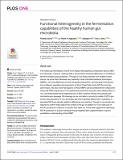Functional heterogeneity in the fermentation capabilities of the healthy human gut microbiota
Author(s)
Gurry, Thomas; Nguyen, Le Thanh Tu; Yu, Xiaoqian; Alm, Eric J
DownloadPublished version (1.681Mb)
Publisher with Creative Commons License
Publisher with Creative Commons License
Creative Commons Attribution
Terms of use
Metadata
Show full item recordAbstract
<jats:p>The human gut microbiota is known for its highly heterogeneous composition across different individuals. However, relatively little is known about functional differences in its ability to ferment complex polysaccharides. Through <jats:italic>ex vivo</jats:italic> measurements from healthy human donors, we show that individuals vary markedly in their microbial metabolic phenotypes (MMPs), mirroring differences in their microbiota composition, and resulting in the production of different quantities and proportions of Short Chain Fatty Acids (SCFAs) from the same inputs. We also show that aspects of these MMPs can be predicted from composition using 16S rRNA sequencing. From experiments performed using the same dietary fibers <jats:italic>in vivo</jats:italic>, we demonstrate that an ingested bolus of fiber is almost entirely consumed by the microbiota upon passage. We leverage our <jats:italic>ex vivo</jats:italic> data to construct a model of SCFA production and absorption <jats:italic>in vivo</jats:italic>, and argue that inter-individual differences in quantities of absorbed SCFA are directly related to differences in production. Though <jats:italic>in vivo</jats:italic> studies are required to confirm these data in the context of the gut, in addition to <jats:italic>in vivo</jats:italic> read outs of SCFAs produced in response to specific fiber spike-ins, these data suggest that optimizing SCFA production in a given individual through targeted fiber supplementation requires quantitative understanding of their MMP.</jats:p>
Date issued
2021Department
Massachusetts Institute of Technology. Department of Biological Engineering; Massachusetts Institute of Technology. Center for Microbiome Informatics and Therapeutics; Massachusetts Institute of Technology. Department of BiologyJournal
PLOS ONE
Publisher
Public Library of Science (PLoS)